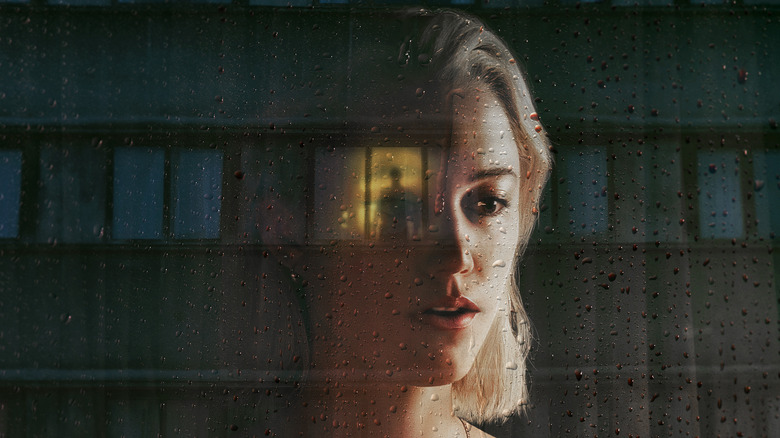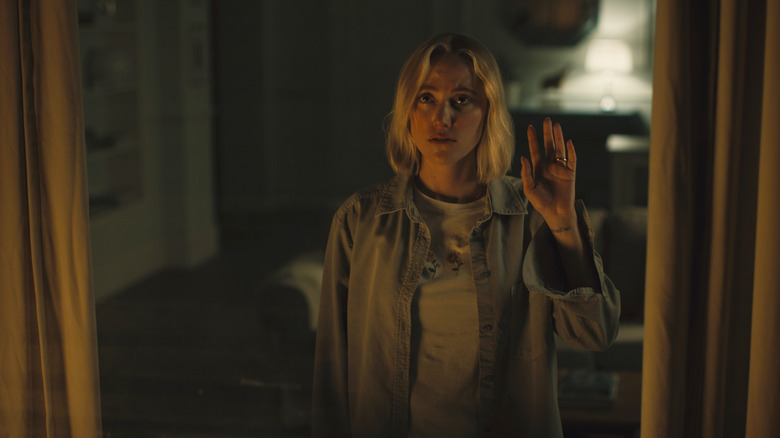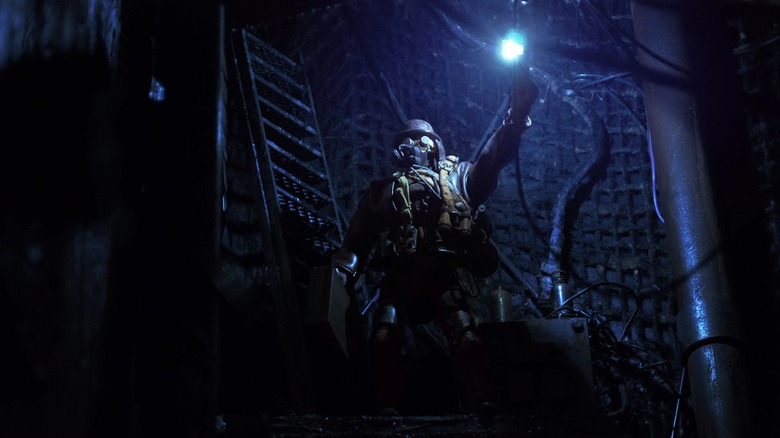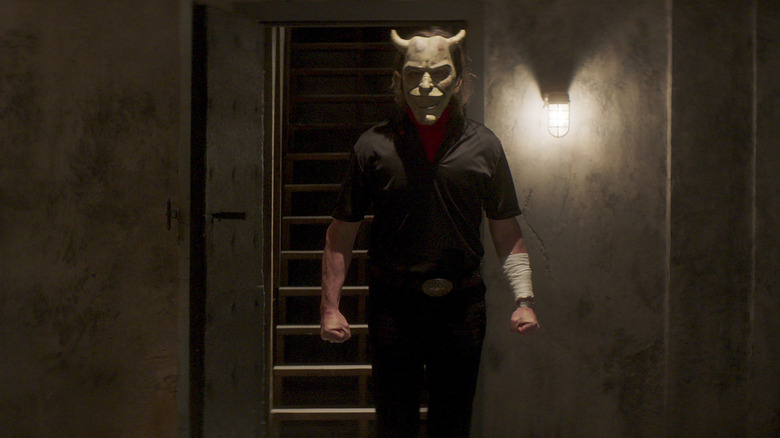Under The Radar: Watcher, Mad God, And More Blockbuster Counter-Programming From June
(Welcome to Under the Radar, a column where we spotlight specific movies, shows, trends, performances, or scenes that caught our eye and deserved more attention ... but otherwise flew under the radar. In this edition: Maika Monroe shines as a very different final girl in "Watcher," VFX guru Phil Tippett unleashes "Mad God" upon us, and Scott Derrickson's "The Black Phone" lives up to the hype.)
The summer months might as well be synonymous with terms such as "excess" and "spectacle." At a time when box office pundits, movie obsessives, and theaters owners alike have been anxiously waiting to declare that movies (and moviegoers) are officially back, the release of a bevy of blockbusters couldn't possibly have felt better-timed. After "Doctor Strange in the Multiverse of Madness" helped get the ball rolling last month, "Top Gun: Maverick," "Jurassic World: Dominion," and even "Lightyear" to a certain extent all came through to remind us that big-budget crowd-pleasers remain largely pandemic-proof at the box office.
It's a slightly different story for smaller films that aren't sequels to pre-existing IPs — specifically when it comes to horror movies competing against superhero movies and legacy sequels and movies based on toys (or, uh, the human that the toy is based on, rather). This time of the year tends to be largely bereft of mid-budget features for that very reason, but a number of films released in this past month (both in theaters and streaming) dared to defy convention. So with summer officially here in the Northern Hemisphere, here's to "Watcher," "Mad God," and "The Black Phone" for providing some welcomed scares as June comes to a close.
Maika Monroe is a star worth watching in Watcher
Fair or not, starring in movies like "The Guest" and "It Follows" at such a young age (in the same year, no less!) will inevitably set the bar impossibly high for any actor. Even in the face of enormous expectations, however, one thing remained clear: Maika Monroe has never lacked the preternatural ability to command the screen.
Director Chloe Okuno clearly held the same opinion while writing and directing "Watcher," her feature film debut released early this month. Set in the washed-out locale of Bucharest, the slow-burning thriller stars Monroe as Julia, a former actor who's moved with her boyfriend Francis (Karl Glusman) to Europe. Alone during the long days while he's away at work and with only a tenuous grasp of the language, Julia tries her best to make the most of the alien surroundings, with Monroe expertly communicating the emotional turmoil inside through her seemingly unbothered veneer. That composure steadily cracks when she first notices the man (Burn Gorman) in the building across the street from her, who appears to stare right into her new apartment through his window on a nightly basis. What follows is a treatise on gaslighting and microaggressions that makes this film uniquely primed for our current moment.
Between her gallingly unsupportive partner, reports of a local serial killer targeting women, and the incessant watcher plaguing her every waking moment, Monroe's rapidly spiraling performance more than makes up for the dearth of actual plot. Though easy to mistake for "one-note," the actor's carefully modulated approach to Julia's paranoia feels pitch-perfect for Okuno's atmospheric tone ... and a remarkably far cry from Monroe's crowd-pleasing, final girl heroics in "The Guest." Even when the script verges on conventionality in the final act, Monroe's performance is anything but.
Mad God needs to be seen to be believed
The mere fact that a stunning, stop-motion nightmare like "Mad God" even exists in the first place and is available on a major streaming service — on Shudder, through which you can get a free 30-day trial here — feels like a miracle in and of itself. The fact that this long-gestating passion project comes from the mind of none other than Phil Tippett, the legendary VFX artist most famously known as the meme-worthy "Dinosaur Supervisor" on "Jurassic Park," outright beggars belief.
So too does the actual movie itself, which largely eschews any traditional semblance of story or narrative in favor of plunging viewers on a dark, disturbing, yet utterly captivating descent into different levels of hell itself. Evoking Biblical imagery seems to be the point, as we open on a Tower of Babel-like structure slowly becoming enveloped in storm clouds and a lengthy scroll, which depicts a passage straight out of the Book of Leviticus detailing the Old Testament God's terrifying wrath on a sinful people. Whatever plot there is seems to rely on the only real character we have to follow: the mysterious "The Assassin," the goggled and trench coat-wearing figure who serenely drops from the sky in a landing craft attached to a single cable.
His Odyssean quest takes him below the earth through increasingly otherworldly tableaus. When he finally lands, he encounters tiny squabbling inhabitants (whom he promptly steps on indifferently), monstrous creatures, lab animals (and people?) subjected to horrific experiments, giants being electrocuted, industrial wastelands literally grinding workers into bloody pulp ... and he silently ignores them all.
Through it all, the craft on display in this breathtaking, dialogue-less film demands our attention. You may not understand "Mad God," but you'll never see anything else like it.
Less is more in The Black Phone
After director Scott Derrickson and writer C. Robert Cargill's dalliance with Marvel blockbusters on 2016's "Doctor Strange" and their ultimately abandoned collaboration on the recently-released sequel, perhaps a certain kind of creative reset was needed to get the storytellers back to what they do best. "The Black Phone" functions perfectly as a back-to-basics palate cleanser, wielding a small but impressively effective cast, a bare minimum of locations (much of the film takes place in one small, suffocating basement), and a playful juggling of tones that keeps the story light on its feet.
Mason Thames is tremendous as Finney, the lovable tween hero who makes for an easy target of bullies at school, but fosters a fierce and protective love for his young sister Gwen (Madeleine McGraw, equally up to the task). Based on Joe Hill's short story, "The Black Phone" takes its time to establish our protagonist, the almost folklore-like hold that the sinister The Grabber (a ruthless Ethan Hawke) has on the small Colorado town, and why we should be invested in Finney's eventual predicament. Gwen's clairvoyance concerning The Grabber's past victims, Finney's friends (and enemies) who end up missing, and the eponymous black phone itself all add personality to this seemingly straightforward thriller.
But more than anything else, Derrickson and Cargill know exactly when to hold back. The eponymous black phone connects Finney to The Grabber's long-dead victims, all of whom are eager to help him escape ... but we never find out exactly how that happens. The Grabber himself provides plenty of clues about his backstory and motivations (a wedding ring, his mannerisms, and his frequently changing mask), but the script wisely avoids any mystique-ruining exposition. Simply put, "The Black Phone" leaves you wanting more in the best way.



